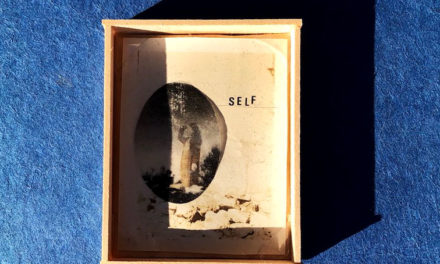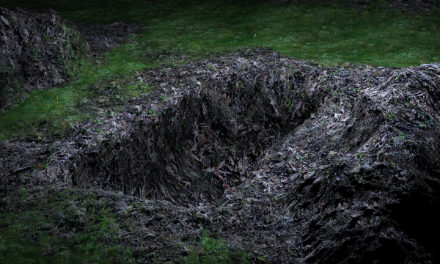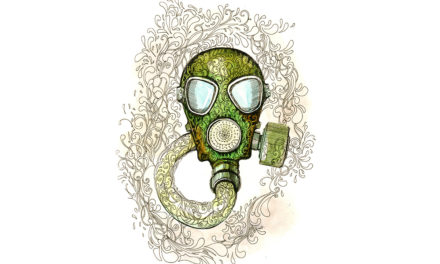Avenging the Daughter of God
by Gary Earl Ross
Issue 10: Afrofuturism | 4,292 words

metal gear mechanism, © Sergey Nivens/Adobe Stock
As the plane leveled off and the lighting in the upper deck first-class cabin shifted to restful blue, John Nkiru eased back his seat and closed his eyes. If he could just drift in semi-sleep for the almost seven hours it took the British Airways 747-400 to reach London, he might be all right. He would arrive just after dawn for what likely would be the longest day of his life since he and Adaolisa had taken turns sitting with Alison in the final hours of her struggle with cancer. Then, he and his daughter had helped each other through the loss. Now…
His eyes opened, and he took the last tissue from the inside pocket of his sports jacket to dab away tears.
“Dr. Nkiru?”
Nkiru looked up into the face of a flight attendant—mid-forties, coffee-colored skin, dark hair beneath her uniform cap, bright eyes. The badge on her pinstriped jacket read Grace Mmadu. The Nigerian surname intrigued him.
“Yes?”
“I’ve been instructed to inform you that when we land, you will be permitted to leave the plane first.” The lilt in her voice was pure London. “Someone from the Home Office will be there to expedite your departure from Heathrow. With your… cargo. If there is anything you require during this flight…”
“Thank you, Ms. Mmadu, but special treatment is unnecessary.”
“On the contrary, sir. You’re an internationally known scientist, a Member of the Order of the British Empire, maybe just a Nobel Prize away from a knighthood. What happened to your daughter in America…” She hesitated, then swallowed. “On behalf of British Airways, I extend our deepest sympathy.”
Grace, as she insisted he call her, returned several times during the flight—to bring his meal, a cocktail to help relax, or an extra pillow. And when most of the other first-class fliers were asleep or lost in a movie on their private screens, she knelt beside his seat as he described the five men in a pickup truck who had run down his daughter as she left a Richmond, Virginia coffee shop to get away from a white supremacy rally that had spun out of control.
“Two in the cab, three in the back,” he said, wiping his eyes again. “They had racist flags and decals on their lorry and were screaming slurs as they drove up onto the pavement to strike this young black girl. They said it was accidental; they were avoiding a crowd in the street. Despite filmed evidence from a mobile phone, they’re free, pending an investigation of the ‘mishap.’”
Grace shook her head and let out a long breath. “Shameful.”
“I thought graduate school in the United States would open a new world for Adaolisa. But it turned out to be the wrong world. A world too ugly for the likes of her.”
Grace placed a hand on his left forearm as he wiped his eyes with the back of his right hand. When he regained himself and apologized, she stood and assured him he was entitled to grieve. “I’ve seen you daughter’s picture. She was every bit as beautiful as her name.”
He swallowed. “Her name meant daughter of God.”
••••
It was nearly two in the afternoon when Michael and Lana Dellinger dropped him at his modest brick home.
Nkiru had mentored Lana in the early days of her academic career. Though he was pleased she was a rising star in the world of theoretical physics, his familial feelings for her made the loss of his daughter more acute. Even worse was sharing the back seat with Lana’s son Jeremy, six. Forcing a smile as he grabbed his duffel and climbed out of their sedan, Nkiru felt his innards twist even tighter at the realization that seized him when he accepted their offer of a ride home after the funeral luncheon: he would never be a grandfather.
After waving as the Dellingers pulled away, he looked up at the twin flat rectangles on his roof, additions everyone assumed were solar panels. He bit his lip as if trying to keep from saying aloud the names of the men who had killed his daughter: Billy Ray McCombs, Luke Wayne Lacy, Tom Osbourne, Jackie Waters, Tip Griffin. Swallowing, he punched in the front door entry code.
Once inside, he climbed the stairs to his bedroom. More than anything, he wanted to sleep but knew that to adjust to the time change he had to stay awake till nightfall. By then, he would be so tired even the almost nightly calisthenics of the young couple in the attached house next door would not interfere with sleep.
Dumping his duffel onto the bed, he dropped his shirts into the laundry basket and hung his sports jacket in the dry-cleaning bag on the back of the door. Before stripping off the black suit he’d put on for the funeral, he emptied his pockets. Then he pulled on a fresh pair of jeans and a pale blue shirt he left untucked. For a moment, he regarded himself in the mirror above the bureau. A lanky frame, black hair cut so close he almost looked bald, a slender ebony face that made him look younger than a man in his early fifties, despite the recent stress lines. Reaching for the wallet he had set on his bureau, he took out the card Grace Mmadu had given him. He saw her once more before disembarking the plane. “We Nigerian Brits must stick together,” she had said, then told him to ring her up if he never needed someone to talk to. It had been a long time since he had been drawn to a woman, since he had enjoyed being with one. He wondered whether he should call her, to thank her for her kindness on the flight and to gauge whether he should call again in another month or two, when life was closer to normal.
Normal? One minute he was preparing to announce a major scientific breakthrough. The next he was dropping his mobile after hearing the absurd words of his daughter’s mentor. Now his lips tingled with the memory of kissing the steel casket before it went into the earth. The bedroom door across the hall would remain shut for months.
He suspected his life would never be normal again.
With sockless feet in a pair of old trainers, Nkiru went down to his cellar and turned on the lights. In the far corner sat a covered cube the size of an overstuffed armchair. He pulled off the quilt to reveal the bright metal object beneath, a stainless-steel box that resembled some kind of battery with cables snaking up the wall to the roof.
Billy Ray McCombs, Luke Wayne Lacy, Tom Osbourne, Jackie Waters, Tip Griffin.
Soon they would pay for what they had done to Adaolisa.
••••
Billy Ray McCombs dropped the bills and junk mail on the dinette table of the efficiency apartment above his mother’s suburban Virginia garage and sat in the only chair to open the package. The thin, ten-inch-long package was wrapped in plain brown paper and had no return address. Tearing the paper off at the top end, he wondered which of the two tactical items he’d ordered recently was inside, the close-quarter combat knife with the brass knuckle haft or the telescoping pocket baton. But the unmarked black box held neither. Instead, there was an oversized wristwatch with a flexible stretch band and an empty display. Beneath it was a folded brochure that read in bold print INTRODUCING THE CAROUSEL TIMESTREAM: The World’s Most Intelligent Smartwatch. Beneath the brochure was a folded one-hundred-dollar bill.
Billy Ray held up the bill for a few seconds. Then he unfolded the brochure and got a magnifying glass from the kitchen’s junk drawer to read the fine print.
Dear Sir or Madame,
You have been selected at random to participate in testing the Carousel Timestream, a watch destined to become the best in the history of timekeeping and the smallest fully functional computer in the history of computing. Like most modern smartwatches, it is a stand-alone mobile phone with all the features you have come to expect: voice activation, facial recognition, Wi-Fi, Bluetooth, music and video streaming, and more (see included manual for more details). A wireless charger is included, though the transflective LED display uses so little power that the watch needs charging only once a week.
How is all this possible? A handful of brilliant engineers with experience in computing and telecommunications have joined forces to create a new mobile operating system that will render iOS, Android, and all other systems obsolete within half a decade.
Because this revolutionary product is still in the testing phase, we will pay you for the time you spend using the Carousel Timestream. By now, you’ve found your first cash payment. To receive additional payments, we encourage you to wear your smartwatch on your arm at all times, openly displayed. We will have Carousel Timestream representatives in your area for the next thirty days. If one of our representatives spots you wearing the watch, you will be given, on the spot, $5,000 in cash (representatives will confirm the watch using the serial number found on the underside).
Best of all, there is no limit to the number of times you may win during the month our representatives are in your area. In thirty days, you will also be sent a product survey, for which you will be given another cash gift of $1,000 upon completion. So, put the information insert in your wallet or purse, the earbuds in your ears, and the smartwatch on your wrist. Wait thirty seconds for the sensors to adjust to your biometrics. Then press the touch screen and say, “Activate!”
Welcome to the future.
The Timestream Team.
Out of work more often than not, frequently in one sort of trouble or another, and years past his last date with a woman, Billy Ray saw nothing to lose in earning tax-free cash his mother knew nothing about. Besides, the money would come in handy if the state decided to press charges over that nigger bitch he’d run down with his truck. The watch was big and easy to spot. He wouldn’t mind hanging around malls for the next few weeks or sitting on a bench downtown, especially if he could watch a movie while he waited for these knuckleheads to spot him. He might even meet some girls who would think his watch was sick. He slid the folded brochure and the Ben Franklin into his wallet, pressed the buds into his ears, and wriggled his hand through the stretch band. Then, he watched the clock above the sink and waited six additional seconds before pressing the screen and telling the watch to activate.
Billy Ray McCombs disappeared.
Forty minutes later, just after 10 p.m. London time, the Carousel Timestream materialized atop the Chronoflex Cube in John Nkiru’s cellar. He was in the parlor upstairs, seated on the sofa and watching television, when one of the computers on his desk signaled the device’s return. After going downstairs to retrieve it, he went to his desk and linked the smartwatch to a computer, which brought up a recorded video. The jerky, dizzying images showed glimpses of horses, men in dirty uniforms, vast greenery, treetops, and a clean blue sky, all obscured by shifting smoke and haze. The soundtrack was a cacophony of gunfire, cannon fire, voices, screams—a myriad of battle sounds. The image went to ground after a few minutes and then was still, suggesting the wearer had fallen and was no longer capable of moving his arm. Over the next minute or so, the picture began to fade. Then it went black, indicating life functions had ceased. The absence of a pulse initialized the smartwatch’s return-to-base program.
“So that was Gettysburg,” Nkiru said softly.
After saving the image to a portable hard drive, Nkiru erased the watch’s memory and put it in a special fireproof lockbox. It would be weeks before he would program and send it through another complex mailing chain to get it to its next destination.
Now there were four: Luke Wayne Lacy, Tom Osborne, Jackie Waters, Tip Griffin.
The following afternoon, he called Grace Mmadu. They talked for an hour and a half and agreed to meet for tea in a few weeks.
••••
Ten months later, Inspector Ian Braithwaite of New Scotland Yard sighed as he climbed out of the front passenger seat of a black supermini. A bronze SUV sat in front of the Heathwood Gardens home. That meant the owner was inside—as usual. After seven visits, Braithwaite was weary of the Yard’s continued efforts to coddle the FBI. Hoping this visit might settle the matter once and for all, he opened the rear door for Beth Shields, the American agent seated inside.
Accepting his hand only because the back had not been designed for someone her height, Shields got out and looked up at the modest brick house. “Nice place,” she said. “What’s that on the roof?”
“Some kind of fancy solar panel.” Braithwaite didn’t bother to look up. He was a full head shorter than the blue-eyed blonde. “Says it handles most of his energy needs, even in dreary London.”
“You mean it’s not usually this sunny? How does he store power?”
“I’ve seen it, a battery unit about the size of an armchair.” Braithwaite bent to speak to his driver. “Shan’t be long.” Then he closed both doors, led Shields to the entrance, and rang the bell.
When the door opened, Dr. John Nkiru stood there in faded jeans and a white shirt, his dark skin smooth and fresh. “Inspector!” He shifted a remote control to his left hand and shook Braithwaite’s outstretched right. “Is there another mystery I cannot help you solve?”
“John, this is agent Shields from Washington.”
“Of course.” Nkiru led them into a spacious, book-lined room. Three computers sat on a desk in one corner, next to a shelf laden with awards and other honors. He gestured toward the sofa, which faced a flat-screen TV he turned off with the remote. They sat, and he took the armchair perpendicular to them, slipping the remote into an armrest caddy. “Has another American disappeared?”
“First thing’s first,” Shields said, cutting off Braithwaite with an uplifted hand. “You were born here fifty-five years ago, to Nigerian immigrants?”
“Yes.”
“And you’re a physicist?”
“Theoretical physicist.”
“And an MBE, presented by the Queen herself,” Braithwaite said.
“I can show you my badge,” Nkiru said.
His schooling, degrees, and honors were all public information, so the recitation of his life sounded like his Wikipedia entry. Instead of challenging Shields or showing exasperation, however, he said yes or nodded his affirmation to each biological detail the agent listed off.
“Married once, to Alison Knight of Kensington, now deceased.”
He bit his lip, closed his eyes. “Cancer.”
“I’m sorry.” And without breaking her rhythm, she touched upon his more recent tenderness. “One daughter, Adaolisa, who attended graduate school in the US and was run down by a truck—or, as you would say, lorry— just over a year ago.”
“Her name meant daughter of God.” Nkiru opened his eyes and gazed into the woman’s without blinking. “Run down? Brutally murdered. By white supremacists.” His voice was level, measured, as if he were giving a lecture.
“Agent Shields,” Braithwaite said, “John—Dr. Nkiru and I have gone over the facts many times. I see no point in rehashing them and adding discomfort to a loss that—”
“Inspector, these men never made it to trial,” Shields said. “Five of them.”
“Yes, they vanished, one by one over several months.” He shrugged. “I’ve come here every time the Bureau has asked and questioned this poor man, this grieving father. Each time, I’ve sent you a report with the same information. Dr. Nkiru is now retired and spends most of his time in London. He does travel on the continent to give lectures and attend conferences, but his passport and official travel records all confirm he has not been in the United States—or even on that side of the Atlantic—since he went to reclaim his daughter’s remains.”
“Nor have I any intention of ever setting foot there again,” Nkiru said. “With all those hateful, backward people.” He steadied himself. “The only good that has come out of all this is I’ve begun seeing someone I met on the plane as I brought my daughter home. She is kind and supportive as I try to learn to live again.”
“Grace Mmadu,” Shields said. “We know all about her. We’ve cross-referenced her travel against these disappearances.”
“And found nothing, I am sure, or you would have mentioned it to me on the way over.”
Shields said nothing.
Braithwaite drew in a deep breath to temper his annoyance. “Look, I reported that on two separate occasions. Dr. Nkiru delivered well-attended public lectures within an hour of each disappearance in the States. More than once, your people have suggested some international murder-for-hire scheme. Dr. Nkiru has zero connection to organized crime or intelligence services. Since you’ve concluded Ms. Mmadu is not involved, who did he hire? Tourists or the Girl Guides?”
Shields leaned forward as if to speak, but Braithwaite held up a finger.
“I have examined his financials. He’s had no monetary transactions with anyone in America except his publishers, who deposit book royalties in an account here in London through established international banking channels.”
“People just don’t disappear,” Shields said.
With elbows on armrests, Nkiru folded his hands beneath his chin. “Agent Shields, people do just disappear. In your country, indigenous women, what you’d call natives or Indians, disappear regularly. So do other women of color. Does the FBI put as much effort into finding them as it does these five white supremacists?”
“Actually, it’s a dozen—neo-Nazis, Klansmen, racists—other than your daughter’s killers.”
Nkiru noticed Braithwaite’s thick eyebrows climb in surprise. “So now you think I’m doing away with other equally useless men? That I’m some kind of serial killer?”
Shields said, “I’ve read several of your papers, one of your books.” For the first time since entering the house, she smiled. “Some of your theories are fascinating.”
“Which ones?”
“Teleportation. The multiverse. The chronoverse.”
Nkiru smiled and sat forward. “You do understand, agent Shields, that a theoretical physicist seeks mathematical proofs of his or her ideas?”
“Yes.”
“I’m no inventor. Proving a theory does not make it applicable to our current reality. Showing you that other universes can exist is a long way from opening a gateway to them. If you are suggesting that I beam over to America, kill someone, and then beam back here, why have you found no bodies?”
“Maybe you brought them with you and disposed of them here.”
Nkiru laughed. “In London? Have you any idea how densely populated this city is? These houses have only fronts and backs. We share walls. I can hear the couple on my right going at it three or four times a week and the old woman on my left sloshing in her tub.” He shook his head. “They’d certainly hear my chainsaw or smell rotting bodies.”
“And time travel?”
“I have no garage to hide my DeLorean. London traffic renders the car out front incapable of reaching the necessary speed.”
Braithwaite laughed. “Maybe you have this endless spiral staircase under your house, with doorways to the past, like this Spanish program my wife watches on the telly, The Ministry of Time.”
Shields said, “Suppose you found a way of combining time travel with teleportation?”
Nkiru was quiet a moment. “How would that work?”
“Imagine you can get a lock on somebody anywhere in the world…”
“A lock?”
“Probably some enhanced GPS thing. So, you get a lock on this person and send him not here but to another era.”
“Any era?”
“One where his presence would least likely damage history. Maybe make dinosaur food of him.” Shields cocked her head slightly. “That would align with the Novikov self-consistency principle.”
“By leaving a human skeleton alongside dinosaur remains to upend paleontology and give credence to American creationist idiots who think the Flintstones were historical? That’s hardly in line with Novikov.” Nkiru chuckled. “Your research is impressive, Ms. Shields, and your idea is so entertaining I’m tempted to say, prove it. But let me propose something else.”
Biting back a smile, Shields said, “All right.”
“If you could visit any period in history, what would it be?”
She thought for a moment. “The women’s suffrage movement.”
“You, Inspector?”
“Easy. The age of knights, castles, damsels in distress.”
“True romantics, both of you. Then imagine this time master teleports people to their idea of the good old days. The inspector wants to sit at the Round Table. You want to march for the vote. What do white supremacists most want? A time and place with only white people.”
“Is that what you did?”
“Why would I ever want to give such cretins their heart’s desire? If I could teleport anyone across time, I would snatch my daughter as she left that coffee shop the day of the riot and deposit her in the seat you now occupy.”
Inspector Braithwaite stood. “I think we’ve bothered you enough, John.”
After they left, Dr. Nkiru sat at his desk and wondered whether Interpol would ever come knocking about disappearances on the continent. Probably not, he thought. Europe understood fascism all too well to take exception to its unexplained disappearances. Such men would likely take themselves off the grid or die at the hands of a rival group. They might be reported missing, but authorities would search hard only if there were evidence some terrorist action was being planned.
He also wondered why romantics never considered the pitfalls of travel to the past: the absence of sanitation, antibiotics, plumbing, regular bathing, doctors, dentists, antibodies for extinct diseases, even the ability to communicate in your native tongue because language changed so much.
John Nkiru had killed no one, and his conscience was clear. He had given the self-proclaimed Master Race a chance to demonstrate its superiority in new surroundings. While he’d offered none of the American or European fascists a choice of where and when they would go to face the challenges of exposure, disease, violence, or a simple scratch, he had sent each somewhere suggested by something he had learned from exploring their social media. The idea had come to him after he happened upon a blog post by Billy Ray McCombs, which said if Gettysburg had gone differently, he might own slaves today.
Luke Wayne Lacy had tweeted about his desire to end all immigration to the United States. Nkiru thought it fitting, then, that he should arrive among the immigrants in steerage, the third-class section of the Titanic, on April 15, 1912, at 1:45 a.m. The section had already been closed off by stewards enforcing the requirement that lifeboats be boarded in order of passenger class. Held back until their “betters” were off-loaded, eighty-four percent of third-class passengers perished. Only 333 bodies of the 1,514 who died were found. Nkiru also knew that undertakers aboard vessels chartered to recover bodies identified and embalmed only first-class passengers, the wealthy with estates to be litigated. Third-class passengers were, for the most part, buried at sea. That particular Carousel Timestream video lasted less than a minute and revealed nothing but a swirl of motion in dark water. Though waterproof, the watch returned covered with sea salt and needed to be cleaned.
Tom Osborne was proud that his English surname had a Viking etymology and had proclaimed himself an Odinist without understanding anything of Norse mythology beyond Marvel comics. He survived less than ten minutes among actual Vikings, who had no idea what he was saying to them as he pled for his life.
When Jackie Waters gave a TV interview in which he said Mexicans were ruining America, he could not have known he would be put to death with other survivors of the Alamo by General Santa Anna. The last section of a long video that had captured the confusion of the battle depicted a hand examining the smartwatch on Waters’s wrist. Briefly, a startled, dirt-smeared officer’s face came into view in the spinning image before the watch went dark, suggesting Waters’s arm had been tossed aside just before the automatic return kicked in.
In his response to a right-wing article trashing the first African-American president, Tilton Paul “Tip” Griffin referred to Barack Obama—whom Nkiru had met once at a White House reception for an international science consortium—as “Halfrican.” Griffin died among the 1,300 British troops lost in the 1879 Battle of Isandlwana, the first engagement in the war between the British Empire and the Zulu Kingdom. Griffin did not live long enough to see the decisive Zulu victory.
Presently, Dr. John Nkiru went upstairs to dress for a casual dinner with Grace at a new establishment in Piccadilly Circus. She had come back from a New York run yesterday and had a few days off, days they would spend together. He began to push aside all thoughts of the men he had sent elsewhere but knew he would only stop the purge once he reached his daughter. One day he might find a means to retrieve people from the past. If ever he did, he would start with Adaolisa, Novikov and damage to history be damned. Until then, it was enough to fire up the Chronoflex in the cellar and improve the here and now, one arsehole at a time.

Gary Earl Ross
Gary Earl Ross is a retired University at Buffalo professor. His books include The Wheel of Desire, Shimmerville, Blackbird Rising, Beneath the Ice, and the Gideon Rimes mysteries Nickel City Blues and Nickel City Crossfire. His staged plays include Picture Perfect, Murder Squared, The Scavenger’s Daughter, The Mark of Cain, The Guns of Christmas, The Trial of Trayvon Martin, and Matter of Intent, winner of the Edgar Award from Mystery Writers of America.




